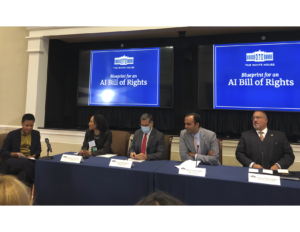White House Announces New Blueprint for an AI Bill of Rights
The Biden Administration, acting through the Office of Science and Technology Policy (OSTP), released yesterday a set of principles aimed at creating a “Blueprint for an AI Bill of Rights.” The goal of the blueprint is to, “help guide the design, development, and deployment of artificial intelligence (AI) and other automated systems so that they protect the rights of the American public.”

From Left to right: Dr. Alondra Nelson, Deputy Assistant to the President and OSTP Deputy Director for Science and Society; U.S. Equal Employment Opportunity Commission Chair Charlotte Burrows; Secretary of Health and Human Services Xavier Becerra; Consumer Financial Protection Bureau Director Rohit Chopra; and Secretary of Education Miguel Cardona.
Within the proposal, OSTP, “identified five principles that should guide the design, use, and deployment of automated systems to protect the American public in the age of artificial intelligence.” Those principles, also called “common sense protections,” are: Safe and Effective Systems; Algorithmic Discrimination Protections; Data Privacy; Notice and Explanation; and Human Alternatives, Consideration, and Fallback. As Rohit Chopra, Director of the Consumer Financial Protection Bureau, pointed out at the rollout event, “fifteen years ago we thought these systems would take bias out; now we know that bias is baked in.”
The white paper includes a technical companion on how to move this plan from “principles to practice,” and an application framework. OSTP says these protections should be entitled to everyone in America and that this blueprint, “offers a vision for a society where protections are embedded from the beginning, where marginalized communities have a voice in the development process, and designers work hard to ensure the benefits of technology reach all people.”
OSTP’s proposal contains no enforcement policies on technology companies and doesn’t recommend any follow-on legislation. But the white paper does highlight existing federal agencies’ commitments to rule making and actions of those agencies to studying the specific impacts of these technologies.
This proposal caps a year-long effort by OSTP to collect feedback and views from the general public, technology companies, and the research community. In fact, CRA’s Computing Community Consortium submitted a formal response to OSTP’s Request for Information on updating the National Artificial Intelligence Research and Development Strategic Plan.
Given the concerns voiced over data privacy and consumer protections by members of Congress in recent years, the issue of algorithmic bias, and how to mitigate or avert it, will not go away here in official Washington. The computing community is well positioned to take part in these efforts and debates, contributing its technical expertise. In fact, Alondra Nelson, Deputy Director for Science and Society at OSTP, said at the briefing, “all of us have a role to play.”








